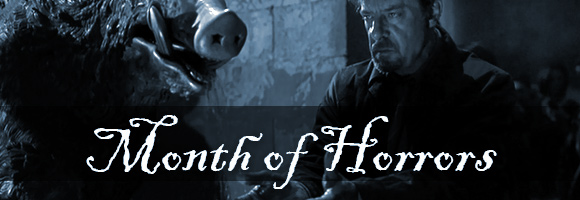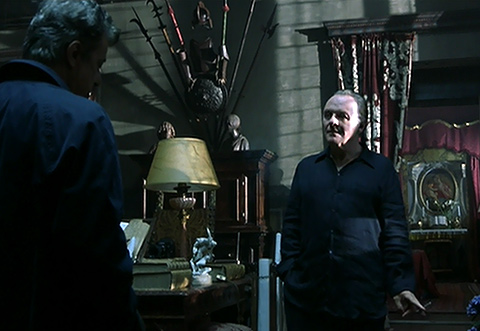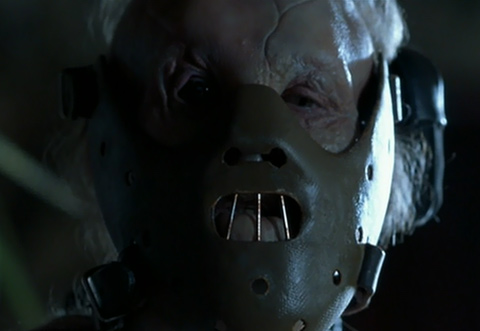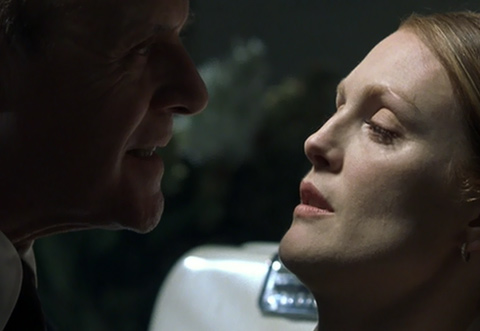Month of Horrors / Hell is Adaptations: Hannibal

After establishing a solid crime thriller formula with Red Dragon and The Silence of the Lambs, novelist Thomas Harris took a chance and tried something entirely different with his wildly popular Hannibal Lecter character: he set him free. Harris’ fans had been wondering for some time what the cannibal psychiatrist would be like in the wild, as it were, out of captivity and free to roam as he pleased. Written eleven years after Silence the novel and eight years after the film, Hannibal is the gory, violent, and disturbing followup to his increasingly popular series. Did it live up to its promise?
It’s hard to say. The next Lecter novel had two very difficult tasks: to tell a story centered for the first time around Dr. Lecter that did justice to everything his readers had learned about him in Dragon and Silence, and to write something that would please the many fans of the film. Even the choice to write a novel with Lecter as a main protagonist must have been a difficult one. It would have been much easier to keep him as a secondary character with Clarice Starling or another FBI agent in the foreground. Harris had built up the mystery and abilities of Dr. Lecter so greatly that it would seem impossible to actually write a story that lived up to what it was claimed he could do when not imprisoned.
And yet, that is exactly what Harris managed to accomplish. Hannibal Lecter in Hannibal is far more frightening than he was in Chesapeake State Hospital. What is only hinted at in the earlier novels is in full display here. Lecter is a Luciferian character in more ways than one: a man in peak physical shape, versatile in mind, impeccable in taste, better educated than most university professors, and possessing an utter hatred of God. He’s more like the Red Dragon of the Apocalypse than the madman who claimed that title as his own. After escaping custody he has fled to Florence, having changed his appearance and found employment as a museum curator, where he passes quite easily as an Italian scholar. His eventual capture by one of his few surviving victims only comes about because he cannot help himself from contacting Starling after she is involved in a career-shattering drug bust gone wrong.

“Killer pajamas.”
But did Harris write a novel that would please all the new fans that came to his writing through the 1991 film? Not really. While Hannibal Lecter was a fan favorite after Anthony Hopkins’ first portrayal, Jodie Foster’s portrayal of Special Agent Clarice Starling was also a big hit, and in Hannibal Starling takes a long walk into the Valley of the Shadow of Death, and never escapes. This shouldn’t be surprising to anyone who had been paying attention to Harris’ misotheistic and otherwise pessimistic philosophy of the world. Whereas it only took Lecter one novel to destroy his nemesis Will Graham, he finds a special pleasure in taking advantage of Starling’s crumbling career to turn her into a monster worthy of his company. Their relationship is reminiscent of that between Lucifer and Lilith of Jewish myth, where the Devil corrupts a woman sufficiently to be a mate worthy of himself.
Jodie Foster and Silence director Jonathan Demme were displeased with this ending and with the novel in general, and so decided to pass on the sequel. Anthony Hopkins stayed attached and pushed for Julianne Moore to replace Foster, though others were considered during development. Producer Dino De Laurentiis approached Ridley Scott on the set of Gladiator to direct Hannibal, which Scott originally turned down, thinking it was about the ancient Carthaginian military commander. After that misunderstanding was cleared up, Scott agreed to direct on the condition that the ending be changed so that Starling remains a “straight arrow” throughout.
The finished film is wildly different in tone and appearance from Demme’s film, and, despite Starling’s character arc being rewritten to appeal to a mass audience and feminist critics, filmgoers weren’t quite sure what to make of this one. Not that this hurt the film financially, but 2001’s Hannibal is not the taut psychological thriller that Silence was, and it lacked some of the popular appeal of that more formulaic story. Hannibal the film moves much faster than the novel, but even at a breakneck speed the clumsiness of the plot is rather obvious. The aesthetic shifts are also more jarring in the film than in the novel, and the contrast between the American and Florentine scenes is more extreme when you can see the ubiquity of good art and architecture in Florence rather than just imagining it.

“Florence is great, but don’t drink the water.”
Hopkins does good acting work again as Lecter, though he’s rather less intimidating ten years on and more than a few pounds heavier. Julianne Moore is good as Starling, though she has what is in my opinion a less inviting face, and that has to subtly affect the willingness of the audience to accept her. Gary Oldman is surprisingly appealing and funny as Mason Verger, a pedophile who survived Lecter’s affections as a heavily deformed cripple. Ray Liotta plays Paul Krendler, a Justice Department official who has it in for Starling’s career, just as creepy and corrupt as Harris wrote him.
The greatest detriment to the film is the weakening of Lecter’s scariness. As mentioned above, Hopkins is good but not as physically intimidating as before. He also doesn’t seem as smart, hiding as he does in plain sight without the slightest alteration to his face with plastic surgery, and him being on the FBI’s top ten most wanted list. He does violently kill his share of people, though since his victims are all villains in their own right, it’s hard to feel terrible–or terrified–about it. One is also left in some confusion about what he wants with Starling in the film. Scott says he believes that Lecter is enamored with Starling because he admires her moral purity, but it’s truly difficult to believe that he has admiration for goodness. Even if he did, it would be impossible to believe that he would willingly make the choice he made with a cleaver in the climax of the film, choosing her good over his own. Whatever Lecter is, he is not selfless.

“Chop, chop, Clarice.”
All in all, Hannibal has some great acting and many memorable visuals, but the story changes neuter much of the novel’s strength. It’s hard to blame Scott for pushing for something different, since an ending that was so hard to pull off in the novel would have been almost impossible on film, where we can’t really see the subtle workings of the characters’ minds. Unfortunately, what we ended up with was pretty weak and anticlimactic. It could have been much worse, but it’s a pity that this is the end of the cinematic Dr. Lecter’s story. There was a rumor a few years back that Hopkins had pitched a script for a sequel where Starling chases Lecter across the globe, but that plan never made it very far.
This is not, however, the last time we would see Hopkins on the big screen as Hannibal the Cannibal. De Laurentiis would finally get his wish of adapting the prequel Red Dragon “right” a year later with Hopkins back in his old cell, this time facing off against Edward Norton as FBI profiler Will Graham.
Coming Soon: Red Dragon!
 Rent Hannibal from Amazon Instant Video
Rent Hannibal from Amazon Instant Video



















 Full Details
Full Details


No comments yet.
Sorry, the comment form is closed at this time.